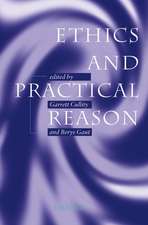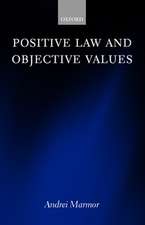The Routledge Companion to Philosophy of Law: Routledge Philosophy Companions
Editat de Andrei Marmoren Limba Engleză Paperback – 7 noi 2014
The entirely new content has been written specifically for newcomers to the field, making the volume particularly useful for undergraduate and graduate courses in philosophy of law and related areas. All 39 chapters, written by the world’s leading researchers and edited by an internationally distinguished scholar, bring a focused, philosophical perspective to their subjects. The Routledge Companion to the Philosophy of Law promises to be a valuable and much consulted student resource for many years.
Din seria Routledge Philosophy Companions
-
 Preț: 386.77 lei
Preț: 386.77 lei -
 Preț: 409.09 lei
Preț: 409.09 lei -
 Preț: 348.60 lei
Preț: 348.60 lei -
 Preț: 348.50 lei
Preț: 348.50 lei -
 Preț: 296.71 lei
Preț: 296.71 lei - 8%
 Preț: 470.62 lei
Preț: 470.62 lei -
 Preț: 346.07 lei
Preț: 346.07 lei -
 Preț: 352.86 lei
Preț: 352.86 lei - 25%
 Preț: 1200.50 lei
Preț: 1200.50 lei -
 Preț: 466.35 lei
Preț: 466.35 lei - 12%
 Preț: 337.30 lei
Preț: 337.30 lei - 11%
 Preț: 335.33 lei
Preț: 335.33 lei -
 Preț: 440.86 lei
Preț: 440.86 lei -
 Preț: 523.44 lei
Preț: 523.44 lei - 18%
 Preț: 1563.30 lei
Preț: 1563.30 lei -
 Preț: 430.48 lei
Preț: 430.48 lei -
 Preț: 437.61 lei
Preț: 437.61 lei - 9%
 Preț: 1792.17 lei
Preț: 1792.17 lei -
 Preț: 545.58 lei
Preț: 545.58 lei - 15%
 Preț: 467.78 lei
Preț: 467.78 lei - 25%
 Preț: 1250.03 lei
Preț: 1250.03 lei - 21%
 Preț: 385.28 lei
Preț: 385.28 lei - 15%
 Preț: 487.87 lei
Preț: 487.87 lei -
 Preț: 478.02 lei
Preț: 478.02 lei - 12%
 Preț: 331.41 lei
Preț: 331.41 lei - 18%
 Preț: 336.84 lei
Preț: 336.84 lei - 15%
 Preț: 607.81 lei
Preț: 607.81 lei - 12%
 Preț: 299.52 lei
Preț: 299.52 lei -
 Preț: 352.18 lei
Preț: 352.18 lei - 15%
 Preț: 455.81 lei
Preț: 455.81 lei - 8%
 Preț: 468.06 lei
Preț: 468.06 lei
Preț: 591.55 lei
Preț vechi: 695.94 lei
-15% Nou
Puncte Express: 887
Preț estimativ în valută:
113.19€ • 118.42$ • 94.03£
113.19€ • 118.42$ • 94.03£
Carte tipărită la comandă
Livrare economică 03-17 aprilie
Preluare comenzi: 021 569.72.76
Specificații
ISBN-13: 9781138776234
ISBN-10: 1138776238
Pagini: 656
Dimensiuni: 174 x 246 x 33 mm
Greutate: 1.1 kg
Ediția:1st edition.
Editura: Taylor & Francis
Colecția Routledge
Seria Routledge Philosophy Companions
Locul publicării:Oxford, United Kingdom
ISBN-10: 1138776238
Pagini: 656
Dimensiuni: 174 x 246 x 33 mm
Greutate: 1.1 kg
Ediția:1st edition.
Editura: Taylor & Francis
Colecția Routledge
Seria Routledge Philosophy Companions
Locul publicării:Oxford, United Kingdom
Cuprins
Table of Contents
Preface
1. Theories About the Nature of Law
1.1. The Nature of Law: An Introduction Andrei Marmor
1.2 Natural Law Theory: Its Past and Its Present John Finnis
1.3 Legal Positivism: Early Foundations Gerald J. Postema
1.4 Legal Positivism: Contemporary Debates Julie Dickson
1.5 The Authority of Law Scott Hershovitz
1.6 Obligations, Interpretivism, and the Legal Point of View Nicos Stavropoulos
2. Legal Reasoning
2.1. Vagueness and the Law Scott Soames
2.2 Legal Interpretation Timothy Endicott
2.3 Precedent Frederick Schauer
3. Theories of Legal Areas
3.1. Criminal Law
3.1.1. The Justification of Punishment Mitchell N. Berman
3.1.2 Wrongness and Criminalization Victor Tadros
3.1.3 The Voluntary Act Requirement Gideon Yaffe
3.1.4 Criminal Attempts R. A. Duff
3.1.5 The Insanity Defense Gary Watson
3.1.6 Self-Defense Larry Alexander
3.2. Contract
3.2.1 Are Contracts Promises? Seana Valentine Shiffrin
3.3. Torts
3.3.1. Proximate Causation in the Law of Torts Benjamin C. Zipursky
3.4 Property
3.4.1 Private Property Daniel Attas
3.4.2 Taxation, Redistribution and Property Rights Peter Vallentyne
3.5 Family
3.5.1 The Pursuit of Intimacy and Parental Rights Scott Altman
3.6 Evidence
3.6.1 Is It Finally Time to Put ‘Proof Beyond a Reasonable Doubt’ Out to Pasture? Larry Laudan
3.7 International Law
3.7.1 International Law and Global Justice Michael Blake
3.7.2 Human Rights John Tasioulas
3.7.3 The Morality and Law of War Seth Lazar
3.7.4 The Legitimacy of International Institutions Thomas Christiano
3.8 Environmental Law
3.8.1 Environmental Ethics, Future Generations and Environmental Law Clark Wolf
3.9 Constitutionalism
3.9.1 Constitutional Interpretation Wilfrid J. Waluchow
3.9.2 Judicial Review of Legislation Jeremy Waldron
4. Law as a Coercive Order
4.1 Coercion William A. Edmundson
4.2 Paternalism Douglas Husak
4.3 Enforcing Morality A.P. Simester
4.4 The Rule of Law Grant Lamond
5. Moral Obligations to Law
51. The Moral Obligation to Obey the Law George Klosko
5.2. Conscientious Objection and Civil Disobedience Kimberley Brownlee
5.3 Law, Loyalty and Citizenship Meir Dan-Cohen
6. Rights and Equality
6.1 Some Questions About Rights Christopher Morris
6.2 Discrimination and Equality Kasper Lippert-Rasmussen
6.3 Privacy Judith Wagner DeCew
6.4 Freedom of Speech Alon Harel
Preface
1. Theories About the Nature of Law
1.1. The Nature of Law: An Introduction Andrei Marmor
1.2 Natural Law Theory: Its Past and Its Present John Finnis
1.3 Legal Positivism: Early Foundations Gerald J. Postema
1.4 Legal Positivism: Contemporary Debates Julie Dickson
1.5 The Authority of Law Scott Hershovitz
1.6 Obligations, Interpretivism, and the Legal Point of View Nicos Stavropoulos
2. Legal Reasoning
2.1. Vagueness and the Law Scott Soames
2.2 Legal Interpretation Timothy Endicott
2.3 Precedent Frederick Schauer
3. Theories of Legal Areas
3.1. Criminal Law
3.1.1. The Justification of Punishment Mitchell N. Berman
3.1.2 Wrongness and Criminalization Victor Tadros
3.1.3 The Voluntary Act Requirement Gideon Yaffe
3.1.4 Criminal Attempts R. A. Duff
3.1.5 The Insanity Defense Gary Watson
3.1.6 Self-Defense Larry Alexander
3.2. Contract
3.2.1 Are Contracts Promises? Seana Valentine Shiffrin
3.3. Torts
3.3.1. Proximate Causation in the Law of Torts Benjamin C. Zipursky
3.4 Property
3.4.1 Private Property Daniel Attas
3.4.2 Taxation, Redistribution and Property Rights Peter Vallentyne
3.5 Family
3.5.1 The Pursuit of Intimacy and Parental Rights Scott Altman
3.6 Evidence
3.6.1 Is It Finally Time to Put ‘Proof Beyond a Reasonable Doubt’ Out to Pasture? Larry Laudan
3.7 International Law
3.7.1 International Law and Global Justice Michael Blake
3.7.2 Human Rights John Tasioulas
3.7.3 The Morality and Law of War Seth Lazar
3.7.4 The Legitimacy of International Institutions Thomas Christiano
3.8 Environmental Law
3.8.1 Environmental Ethics, Future Generations and Environmental Law Clark Wolf
3.9 Constitutionalism
3.9.1 Constitutional Interpretation Wilfrid J. Waluchow
3.9.2 Judicial Review of Legislation Jeremy Waldron
4. Law as a Coercive Order
4.1 Coercion William A. Edmundson
4.2 Paternalism Douglas Husak
4.3 Enforcing Morality A.P. Simester
4.4 The Rule of Law Grant Lamond
5. Moral Obligations to Law
51. The Moral Obligation to Obey the Law George Klosko
5.2. Conscientious Objection and Civil Disobedience Kimberley Brownlee
5.3 Law, Loyalty and Citizenship Meir Dan-Cohen
6. Rights and Equality
6.1 Some Questions About Rights Christopher Morris
6.2 Discrimination and Equality Kasper Lippert-Rasmussen
6.3 Privacy Judith Wagner DeCew
6.4 Freedom of Speech Alon Harel
Descriere
The Routledge Companion to the Philosophy of Law provides a comprehensive, non-technical philosophical treatment of the fundamental questions about the nature of law.




















